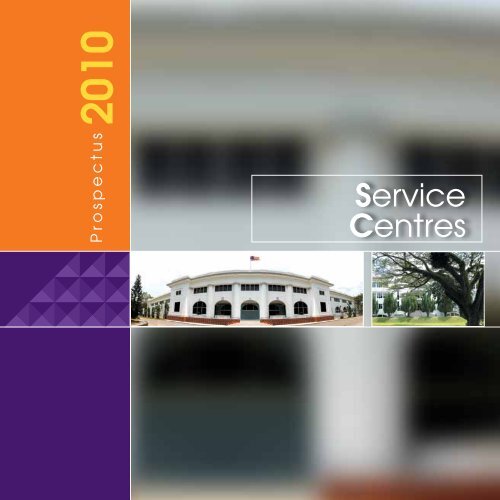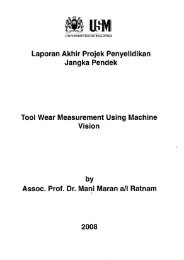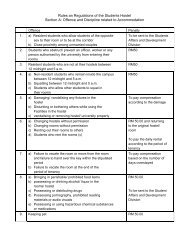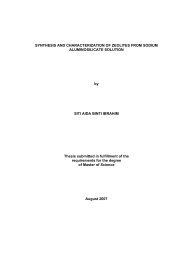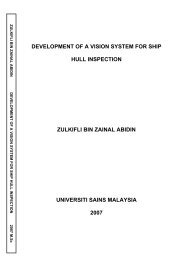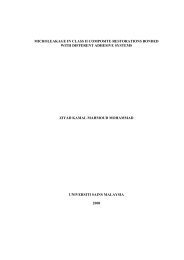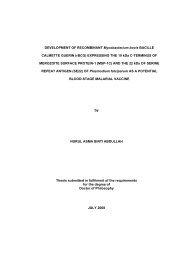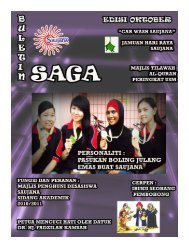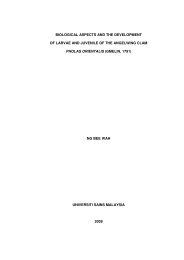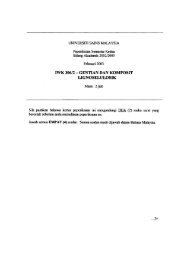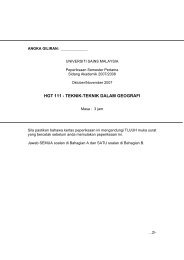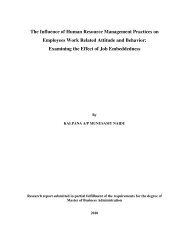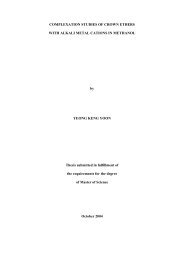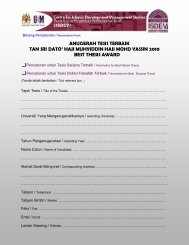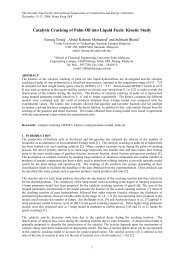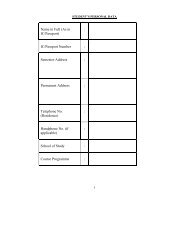Service Centres - USM
Service Centres - USM
Service Centres - USM
You also want an ePaper? Increase the reach of your titles
YUMPU automatically turns print PDFs into web optimized ePapers that Google loves.
P r o s p e c t u s 2010<br />
<strong>Service</strong><br />
<strong>Centres</strong>
w w w . u s m . m y<br />
Prospectus 2010<br />
S E R V I C E C E N T R E S
Centre for Instructional Technology<br />
and Multimedia (CITM)<br />
The Centre for Instructional Technology and Multimedia (CITM) was established to<br />
promote excellence in University instruction and to advance the development and use<br />
of Instructional Technology in teaching and learning. CITM is responsible for maximising<br />
the effective use of Instructional and Information Communication (ICT) technologies to<br />
meet the University’s academic and non academic goals and priorities. CITM addresses<br />
this mission by providing professional and technical support for:<br />
• Instructional Development: the design, development, and evaluation of courses<br />
and instructional materials that employ instructional media, ICT and computer<br />
technology.<br />
• Faculty and Staff Development: professional development for faculty and<br />
staff especially in the use of computers and ICT in their efforts to improve or<br />
enhance instruction and learning. These workshops are also open to other colleges,<br />
government agencies, and organisations.<br />
• Instructional Support: services related to classroom support, such as the<br />
provision and maintenance of audio/visual systems to the University community<br />
as well as providing facilities for professional graphics, photographic, video and<br />
multimedia production. CITM also assists in the design of lecture theaters and<br />
continuously investigates, evaluates, acquires, and promotes emerging technologies<br />
to support enhancement of the teaching and learning processes and the delivery<br />
of instruction.<br />
Leadership in research and advancement of Instructional Technology in teaching,<br />
learning, production and training is realised through the continuous research<br />
and consultation projects undertaken by its staff and through the offering of:<br />
• Two research-mode graduate programmes at the master’s and<br />
doctoral levels (M.A. and Ph.D.). These programmes allow candidates<br />
to build and test processes, products, systems, and services for use in<br />
education and training settings through an interdisciplinary structure<br />
that encompasses instructional design theories and models, learning<br />
and cognition, instructional strategies and methods, for static and mobile<br />
learning, visual design, web design, media design and ergonomics.<br />
• A coursework-mode Master in Instructional Multimedia (MIM) degree program<br />
that is conducted in English. This program promotes the use of performance<br />
technology and emphasises the application of systems approach models to<br />
design, develop and implement technology-based education and performance<br />
programmes.
• A set of courses in Instructional Technology at the undergraduate and graduate<br />
levels for the School of Educational Studies for its B.Ed., B.A.Ed., B.Sc.Ed., M.Ed.,<br />
and Ed.D. programmes.<br />
Academic Staff<br />
Director<br />
Assoc. Prof. Merza Abbas<br />
(Instructional Design & Multimedia Production)<br />
Deputy Director<br />
Dr. Mona Masood<br />
(Multimedia Production, Instructional Systems Technology)<br />
Assoc. Prof. Irfan Naufal Umar<br />
(Instructional Design and Tecnology)<br />
Assoc. Prof. Toh Seong Chong<br />
(Multimedia Design and Development,<br />
Web-Based Instruction, Rapid Prototyping<br />
of Courseware)<br />
Assoc. Prof. Zarina Samsudin<br />
(Computers in Education, Multimedia in<br />
Education, Media Production Design)<br />
Dr. Wan Ahmad Jaafar Wan Yahaya<br />
(ICT in Education, Multimedia-based<br />
Education)<br />
Rossafri Mohamad<br />
(Resource and Information Technology,<br />
Multimedia in Education)<br />
Lecturers<br />
Assoc. Prof. Rozinah Jamaludin<br />
(e-Learning, Web-Based Instruction)<br />
Assoc. Prof. Wan Mohd Fauzy Wan<br />
Ismail<br />
(Instructional Multimedia Design,<br />
Human-Computer Interface, Instructional<br />
Telecommunication)<br />
Dr. Balakrishnan Muniandy<br />
(Instructional Technology, ICT in Education)<br />
Tuan Haji Ahmad Moghni Salbani<br />
(Instructional Technology, Learning<br />
Counseling)<br />
For further information, please contact:<br />
Director<br />
Centre for Instructional Technology and Multimedia (CITM)<br />
Universiti Sains Malaysia<br />
11800 Pulau Pinang<br />
Tel: 04-6533888 ext. 3222/3224/3825<br />
04-6533222/04-6533224<br />
Fax: 04-6576749<br />
e-mail: dir_citm@usm.my
Centre for Knowledge,<br />
Communication & Technology<br />
Information, Communications and Technology (ICT) is the enabler and key to<br />
knowledge creation and dissemination. The Centre for Knowledge, Communication<br />
and Technology (PPKT) understands its rolein assisting with the achievement of the<br />
University vision. PPKT’s key function is to plan and implement ICT projects. Its value<br />
added service is to consult/advise the University with regard to utilising, managing and<br />
linking Knowledge/Information, Communications and Technology.<br />
Vision<br />
Fulfilling the ongoing operational and strategic ICT requirements of the University<br />
based on knowledge, research and innovation, locally and globally.<br />
Mission<br />
Ensure availability, reliability and service ability of the ICT infrastructure and services<br />
to <strong>USM</strong> campus-wide in-line with the strategic and operational requirements of <strong>USM</strong>.<br />
Strategy<br />
PPKT is set to strategically and comprehensively upgrade the capacity and performance<br />
of ICT services campus-wide in-line with <strong>USM</strong>’s status as a Research and APEX<br />
University through these five areas:<br />
Network Infrastructure: Providing high performance, high security, high availability<br />
and scalable network system, telecommunication and service infrastructure.<br />
Knowledge and Information Management: Provides functionality to enterprise<br />
executives to retrieve information to support strategic decision-making processes,<br />
and to operational managers to support tactical decision-making.<br />
Administrative and Academic Computing: Focus on application integration on<br />
administrative processes and support. Main processes and operational activities are<br />
based on “<strong>USM</strong> Application Framework” or blueprint. Support academic computing<br />
resources such as grid computing resources.<br />
Corporate Management: Encompasses ICT strategic planning, project management,<br />
customer relations management and training.
ICT Security: Plan, execute and monitor ICT security policies, and monitor various<br />
security aspects such as virus and hackers. Guarding the secrecy and security of<br />
electronic communication, and preventing threats and misuse of ICT resources.<br />
For further information, contact:<br />
Chief Information Officer<br />
Centre for Knowledge,<br />
Communication & Technology<br />
2 nd Floor, Eureka Complex<br />
Universiti Sains Malaysia<br />
11800, Penang<br />
e-mail: cio@usm.my<br />
or visit our homepage at<br />
http://enovate.usm.my<br />
Chief Information Officer (CIO)<br />
Zulham Hamdan<br />
Deputy CIO, PPKT Engineering Campus<br />
Fadzil Saidin<br />
Deputy CIO, PPKT Health Campus,<br />
Infostructure Management<br />
Rasid Abdul Rahman<br />
Deputy CIO, Corporate <strong>Service</strong>s<br />
Abdul Rashid Baba<br />
Deputy CIO, Knowledge Management<br />
Abdul Rahim Rohany<br />
Deputy CIO, Administrative Computing<br />
Mohd Naser Harun
Corporate and Sustainable<br />
Development Division<br />
The Corporate and Sustainable Development Division (CSDD) was established in<br />
February 2000 as a department in the Office of the Vice-Chancellor. It integrates three<br />
functions namely Strategic Planning, Quality Assurance and the Executive Information<br />
<strong>Service</strong> (EIS). In February 2000, the Division was relocated to the present building;<br />
C03. The Division also housed The Healthy Campus Development Programme and<br />
The Regional Centre of Expertise, that were launched in 2000 and 2005 respectively.<br />
Our Objectives<br />
The Government’s decision to corporatise the universities initiates the move towards<br />
fully self supporting institutions. This trend creates a need to focus on achieving<br />
maximum returns from the use of resources at our disposal. For <strong>USM</strong> to achive<br />
this target, the Corporate and Sustainable Development Division was established<br />
to provide a framework to set policies, standards and guidelines as well as monitor<br />
implementation that will drive the competitiveness of the University in its two main<br />
activities: education and research.<br />
Activities<br />
1. Coordinating <strong>USM</strong>’s Strategic Plans<br />
The Corporate and Sustainable Development coordinates the development of<br />
strategic plans to improve staff competence, upgrade the academic system, protect<br />
the environment, define the organisation structure, adopt intelligent technology and<br />
review the management systems.<br />
It is empowered to explore opportunities for the University to engage efficiently in<br />
businesses and research with national and international organisations, CSDD is also<br />
committed to protecting the intellectual property rights of the University and its staff<br />
through a system of vigilant monitoring and rigorous guidelines.<br />
2. Executive Information <strong>Service</strong>s<br />
The Executive Information <strong>Service</strong> creates and develops a critical set of performance<br />
indicators to assists senior management in decision-making and their efforts to balance<br />
short-term plans against long-term targets. In this vital role as an information source,<br />
the Executive Information <strong>Service</strong> implements a process of systematic collection and<br />
management of data using the latest methodologies.
The statistical data that is produced for senior management is user-friendly and data on<br />
performance indicators are published on a half-yearly basis. Data is also collected for<br />
benchmarking development in human resources against its investments as expenditure<br />
on personnel accounts for a high proportion of the University’s annual budget.<br />
3. Memorandum of Understanding (MoU) and Memorandum of Agreement<br />
Advisory<br />
<strong>USM</strong> Corporate and Sustainable Development Division also plays an important role<br />
as the centre point of Mou/MoA signing process at the University. Working closely<br />
with <strong>USM</strong> Legal Unit and <strong>USM</strong> School of Languages, Literacies and Translation, <strong>USM</strong><br />
Corporate tries to assists <strong>USM</strong> <strong>Centres</strong> and Schools on the legal and language aspects<br />
of their MoUs and MoAs with external parties. This will assure the legality and efficiency<br />
of the MoU/MoA signing process.<br />
4. Secretariat of <strong>USM</strong> for Key Performance Indicator (KPI)<br />
<strong>USM</strong> Corporate and Sustainable Development Division is home to the Secretariat<br />
of <strong>USM</strong> Key Performance Indicator (KPI). This includes collecting data, evaluating and<br />
auditing the performances of various <strong>USM</strong> centres and School to determine their KPI<br />
which serves the University in reaching its goal as a Research University (RU).<br />
5. Secretariat of the <strong>USM</strong> APEX Steering Committee<br />
The Programme for Excellence (APEX) is a fast track development programme for<br />
Institutions of Higher Education in Malaysia to achieve and attain recognition as worldclass<br />
institutions of higher learning. There are several reasons as to why Universiti Sains<br />
Malaysia believes that it should be considered and selected as an APEX university. Since<br />
its establishment in June 1969, <strong>USM</strong> has registered remarkable accomplishments in<br />
teaching and learning as well as research and innovation activities thus giving merit to<br />
the status that was be queathed upon the institution. Furthermore, the university is<br />
well-poised to attain world-class status as it has built the basic infrastructure needed<br />
to be more competitive at the global level including the potential to attract quality staff<br />
and students both locally and abroad. Following its role as the secretariat to the <strong>USM</strong>-<br />
APEX Steering Committee, The Corporate & Sustainable Development Division assists<br />
in facilitating the programmes under the 9 working committees that were established<br />
to undertake projects that relate to the concentration of talent, the transformation of<br />
nurturing and learning to accomplish resources and supportive governance as well as<br />
research and innovation services. Eventually, the key performance indicators (KPIs) for<br />
the APEX programme in <strong>USM</strong> will be articulated and manifested in the sustainability<br />
relevant issues particularly to those at the bottom of the pyramid.
6. i-PMO – Institutional Project Management Office<br />
The PMO (Programme Management Office) at MOHE oversees the National Higher<br />
Education Plan (PSPTN) implementation and progress tracking in all IPTAs. The<br />
Corporate and Sustainable Development Division as the i-PMO of <strong>USM</strong> therefore helps<br />
to facilitate activities at the University level as outlined in the Critical Agenda Projects<br />
in order to provide the best possible educational experience for our students through<br />
excellence in teaching, research and creative activities, and services. It is hoped by the<br />
Corporate Division that with careful coordination and by playing an active role in the<br />
facilitating of the outlined activities i.e. ensuring proper implementation of procedures<br />
and goal-attainment as set by the Critical Agenda Projects that the division will be able<br />
to contribute to the Ministry’s vision in regards to excellence in Institutions of Higher<br />
Learning across the country.<br />
Director<br />
Prof. Muhammad Jantan<br />
Coordinator<br />
(Healthy Campus Programme)<br />
Assoc. Prof. Lee Lik Meng<br />
Information System Officers<br />
Fa’izah Md. Zain<br />
Statistician<br />
Norlela Hashim<br />
Principle Assistant Registrar<br />
Zolkifli Yaakob<br />
Assistant Registrar<br />
Moganeswary Muthusamy
Healthy Campus Programme<br />
The Genesis of A Sustainable Campus<br />
Kampus Sejahtera, is a unique <strong>USM</strong> innovation initiated by the current Vice-Chancellor,<br />
Prof. Tan Sri Dato’ Dzulkifli Abdul Razak in 2001 as the Healthy Campus Programme.<br />
Sejahtera in Malay embraces peace, harmony, tranquility, wellness and health. There<br />
is no equivalent work in English language. As a concept, Kampus Sejahtera is meant<br />
to guide the entire <strong>USM</strong> community from administrators to lecturers, students and<br />
support personnel to focus their commitment and responsibility to the university.<br />
Every individual has a role to play through personal initiatives, positive attributes, proactive<br />
actions and volunteerism in nurturing the development of the campus.<br />
It is a framework which encompasses five underlying values. The first is to create a<br />
mindset for every individual to take responsibility for the campus. The second value<br />
seeks to create spaces, both physical and social, which are conducive for work, play and<br />
learning. Thirdly, the practices in the campus must promote the ideas of sustainable<br />
development that is environmentally-friendly, pedestrian-friendly, work and peoplefriendly<br />
as well as promote healthy lifestyles. The fourth is provision of quality health<br />
lifestyles and dental care services to students and staff. Finally, Kampus Sejahtera<br />
supports any activity or project which propagates the pursuit of a sustainable campus.<br />
“The White Coffin” campaign and “Say No to Plastic Bags” campaign are the latest in<br />
a series of student centred activities. Concurrently, other activities that are organised<br />
through the Healthy Campus Programme included Earth Hour 2008, students’ recycling<br />
programme, Green Office, bicycling, healthy cafeteria, tree planting and others that<br />
contribute to the healthy living and a sustainable lifestyle. Follow-up activities included<br />
Tapau-mania which was carried out with the support of Tupperware to encourage<br />
the campus community to bring their own reusable containers when buying takeaway<br />
food at our canteens and the SMS Mi project which stands for “Senyum, Mesra,<br />
Saling Menyayangi” which promoted friendship and goodwill amongst the campus<br />
community as well as conveying the message of the “Say No To Plastic Bags” campaign<br />
in a friendly manner. A monograph of these students’ environmental activism will be<br />
published, gathering personal reflections and experiences of students and staff.
Coordinator<br />
Assoc. Prof. Lee Lik Meng<br />
Contact:<br />
Healthy Campus <strong>USM</strong>,<br />
Corporate and Sustainable Development Division,<br />
Universiti Sains Malaysia,<br />
11800 <strong>USM</strong>, Penang.<br />
Tel: 604- 653 4121 ext. 4121,<br />
Fax: 604- 656 9298,<br />
Email: likmeng@gmail.com<br />
Website: http://healthycampus.usm.my/ver3
Islamic Centre<br />
The Universiti Sains Malaysia Islamic Centre started in 1983 as the Islamic Affairs Unit.<br />
The main function of the Islamic Centre is to educate and facilitate <strong>USM</strong> students and<br />
staff in developing their personality with strong Islamic characteristics through the<br />
concepts of Iman and Taqwa.<br />
Continuous educational efforts have been carried out through various activities<br />
comprising lectures after prayers, seminars, courses, workshops and the distribution<br />
of brochures and magazines from time to time. The Islamic Centre gives University<br />
dwellers and those staying nearby including non-Muslims an opportunity to have a<br />
better grasp of Islam.<br />
The Islamic Centre aspires to educate and to lead mankind in the best way possible<br />
to achieve the noblest development for human beings, as the servants and Caliphs of<br />
Allah through the dissemination of true knowledge, based on virtue of manner, quality<br />
and excellence, in order to motivate and to innovate so that the followers become<br />
worthy human beings.<br />
The <strong>USM</strong> Islamic Centre also plays its role as an Islamic Education and Tuition Centre<br />
for the University’s Islamic students and staff by producing books, pamphlets and other<br />
research-related documents on Islam. In addition, the Islamic Centre offers other<br />
knowledge-based, welfare and counseling services to the students and staff.<br />
The Centre has an active programme of seminars/conferences and<br />
publications. A number of national and local agencies have work closely<br />
including the Federal Islamic Religious Council (JAKIM), National Space<br />
Agencies (ANGKASA), Islamic religious Council of Penang (JAIPP)
and Mufti’s Department of Penang (JMNPP) with whom a few local seminars have<br />
been organised in the year 2006 and 2007. The Centre working hand in hand with the<br />
Astronomy and Atmospheric Science Research Unit (AASRU) in providing information<br />
on astronomical and atmospheric knowledge to the public and organised public viewing<br />
of special events like eclipse and comet in the outreach programme.<br />
The publication unit established in this Centre, is actively involved in the publication<br />
of all the Islamic base knowledge. This includes project writing of Al-quran by using<br />
the Thuluth (khat) and also the establishment of the study of Al-Quran and Science.<br />
The establishment of the student and an International Unit in the centre had provided<br />
the Muslim International student a stop centre in facilitating their need. This include<br />
in organising the International Forum, Seminar and accommodating their culture social<br />
environment. The same activities were also activating at the two other centre, Health<br />
Campus in Kelantan and Engineering Campus in Nibong Tebal.<br />
Director<br />
Assoc. Prof. Nasirun Hj. Mohd. Saleh<br />
Deputy Director (Health Campus)<br />
Dr. Hj. Wan Nudri Daud<br />
Hj. Abd. Rhaffor Hj. Mahmud<br />
Islamic Affairs Officers<br />
Hj. Md. Yusof Abd. Rahim (Engineering Campus)<br />
Hj. Mohd. Shukri Osman (Engineering Campus)<br />
Hj. Mohd. Zamrus Mohd. Ali (Al-Hafiz)<br />
Hjh. Rohayati Daud<br />
Amirah Abdul Sattar (Health Campus)<br />
Fadzilah Abd. Wahab<br />
Mohamed Suhaimi Mostapar (Health Campus)<br />
Nazrul Hassan Nazrul<br />
Zayd Zhari (Al-Hafiz)
Quality and Accreditation Division<br />
The academia and the engineering profession has always been acknowledged worldwide<br />
as the important foundation in the development of any specialised technical experts<br />
and is the vital component of any country worldwide striving for industrialised and<br />
developed nation status. With globalisation and the present economic challenges a<br />
reality, the academic and industrial sector of Malaysia and Universiti Sains Malaysia<br />
needs to acquire cutting-edge technology to stay competitive whilst sustaining the<br />
growth momentum of the industry.<br />
World leaders acknowledge that accountability, via quality assurance and systematic<br />
academic accreditation, complemented by responsible sustainable development<br />
awareness in academia and the industry is a great asset in systematic strategic national<br />
development aimed towards maintaining a world-class and responsible academic<br />
and industrial sector. The demand of competent engineering experts regionally and<br />
worldwide will intensify exponentially with the gradual increase in competition and<br />
cost effectiveness expected in efficient industrial development worldwide.<br />
Malaysia and Universiti Sains Malaysia needs to confidently promote their high-impact<br />
expertise overseas and actively support the sustainable industrial development<br />
programmes projects of various countries worldwide. This ingenious era of<br />
globalisation has encouraged and opened up unlimited business opportunities in the<br />
mobility of engineering expertise within the region and the global community. The<br />
recently established ‘Quality and Accreditation Division’ in 2009 is attached to the<br />
Director’s Office of the <strong>USM</strong> Engineering Campus, Universiti Sains Malaysia.<br />
As the pioneer APEX University in Malaysia, this Quality and Accreditation Division<br />
under the auspices of the Engineering Campus Director aims to be the de-facto<br />
academic benchmark for the global community to showcase the latest quality and<br />
accreditation standards and practices to further propel this economic industrial sector<br />
towards another level of excellence in the 21 st century. The ready availability of world<br />
class engineering experts and workforce conversant in state-of-the-art technological<br />
innovations complemented by economic, environmental savvy, occupationally safe<br />
and sustainable aspects would be a great asset to any country since this precious<br />
experienced economic human capital can be easily mobilised anywhere round the<br />
world to solve any impending engineering challenges overseas.
<strong>USM</strong>’s Quality and Accreditation Division’s aspiration is to act as an invaluable<br />
platform for all in the academic and industry to network, exchange ideas and offer<br />
resolutions to further strengthen the prestige of the academia, engineering profession<br />
and industrial sector towards achieving further economic enhancement and industrial<br />
growth for any nation worldwide. The need for the implementation a strategic quality<br />
and accredited academic and human capital development programme in the academic<br />
sector should thus be emphasised towards internationalisation of any country’s higher<br />
education sector towards world-class recognition.<br />
The workforce of the industrial sector should be technically competent and also well<br />
conversant in all specialised technical skills to deal with the public and their international<br />
counterparts to progress in this progressive knowledge-based (k-) economy era. Some<br />
of the critical strategic directions of the established Quality and Accreditation Division<br />
includes: spearheading several seminars and in-depth discussions with management<br />
and academics so that the various <strong>USM</strong> engineering programmes attains and maintains<br />
at world-class accreditation standard as expected of the international engineering<br />
accreditation council (WA), implementation of various activities to further enhance<br />
the quality of <strong>USM</strong> governance and management mechanisms to another level of<br />
distinction aimed towards continuous quality improvement; and finally coordinating<br />
with various local and international agencies to benchmark Universiti Sains Malaysia’s<br />
academic programmes against other international renowned institutions of higher<br />
learning worldwide. The innovative members of the Quality and Accreditation/<br />
Outcome-Based Education (OBE) Committee for Engineering programmes with<br />
the strong support of the various <strong>USM</strong> Engineering Director and respective <strong>USM</strong><br />
Engineering Deans include:<br />
Deputy Dean & Head of OBE,<br />
School of Aerospace Engineering.<br />
*Assoc. Prof. Mohd. Zulkifly Abdullah<br />
Deputy Dean & Head of OBE,<br />
School of Materials & Minerals<br />
Res. Engrg.<br />
*Assoc. Prof. Azhar Abu Bakar<br />
Deputy Dean & Head of OBE<br />
School of Chemical Engineering<br />
*Dr. Syamsul Rizal Abd. Shukor<br />
Chairman:<br />
Prof. Dato’ Ir. Eric Goh<br />
Programme Chairman &<br />
Head of OBE,<br />
School of Civil Engineering<br />
*Assoc. Prof. Ir. Md. Azlin Md. Saad<br />
Deputy Dean & Head of OBE,<br />
School of Electrical & Electronic<br />
Engineering<br />
*Assoc. Prof. Mohd Rizal Arshad<br />
Deputy Dean & Head of OBE<br />
School of Mechanical Engineering<br />
*Abdus Samad Mahmud<br />
Secretariat:<br />
Rosni Hasan
Some of the success stories carried out by <strong>USM</strong>’s Quality and Accreditation Division<br />
with close cooperation of the <strong>USM</strong> Engineering Campus Director, Professor Khairun<br />
Azizi, together with all pro-active <strong>USM</strong>’s academic and management staff for 2009<br />
includes: ‘Outcome-Based Education Workshop’ (20 th -21 st May 2009), Quality and<br />
Accreditation Committee meetings, ‘Academic Staff Professional Recognition Quality<br />
Seminar’ (19 th August 2009) and Advanced OBE Engineering Workshop (23 rd December<br />
2009), In-depth discussions were also carried out by the Quality and Accreditation<br />
Division with various <strong>USM</strong> Engineering Schools and the respective academic staff to<br />
further strengthen and enhance the mechanism in the effective preparation of the<br />
Engineering Accreditation Council (EAC)’s Self-Assessment Reports and the relevant<br />
strategic action plans for the various engineering academic programs. All the innovative<br />
strategic action plans carried out actively by this Quality and Accreditation Division<br />
of the <strong>USM</strong> Engineering Campus is aimed towards continuous quality improvement<br />
(CQI) and the further enhancement of the Universiti Sains Malaysia’s engineering<br />
programs towards world-class quality and accreditation excellence.
Regional Centre of Expertise on<br />
Education for Sustainable<br />
Development (RCE Penang@<strong>USM</strong>)<br />
The United Nations University-Institute of Advanced Studies (UNU-IAS) has on 29th<br />
June 2005 appointed seven pioneer Regional <strong>Centres</strong> of Expertise (RCE) including RCE<br />
Penang@<strong>USM</strong> to spearhead the concept of education for sustainable development. An<br />
RCE is a network of existing formal, non-formal and informal education organisations,<br />
mobilised to deliver education for sustainable development (ESD) to local and regional<br />
communities. A network of RCEs worldwide will constitute the Global Learning Space<br />
for Sustainable Development. RCEs aspire to achieve the goals of the UN Decade of<br />
Education for Sustainable Development (DESD, 2005-2014), by translating its global<br />
objectives into the context of the local communities in which they operate.<br />
RCE Penang@<strong>USM</strong> has successfully established its position as a centre committed to<br />
address the needs and challenges of sustainable development by using an educational<br />
framework which is capable of ensuring sustainability in the region. RCE Penang@<br />
<strong>USM</strong> tries to pursue the ideals, agendas and principles of education for sustainable<br />
development by synergising the university-community partnership. The mission of RCE<br />
Penang is to build capacity to deliver, support and generate innovative education for<br />
sustainable development (SD) in Penang. This will be achieved by working with partners<br />
and by developing a coordinated communication and dissemination framework for<br />
regional ESD projects and programs.<br />
Objectives:<br />
Knowing the challenges and the needs of the region of operation, RCE Penang’s<br />
objectives have been set to:<br />
• Cultivate sustainable development competency.<br />
• Promote regional commitment to sustainable development.<br />
• Advance the sustainable development competence of all the region’s citizens to<br />
facilitate social inclusion and to activate participation in SD.<br />
• Promote sustainable management and use of the region’s physical, cultural and<br />
environmental assets.<br />
Activities:<br />
1. The network for the Promotion of Sustainability in Postgraduate Education and<br />
Research (ProSPER.Net) is a network of several leading higher education institutions<br />
in Asia and the Pacific that have committed to work together to integrate Sustainable<br />
Development (SD) into postgraduate courses and curricula. Member institutions
involved have strong education and research programs in sustainable development<br />
and related fields. The ProSPER. Net academic and research alliance is an effort of<br />
the ESD Program at UNU-IAS to bring about understanding and delivery of ESD<br />
and SD at the postgraduate level. RCE Penang@<strong>USM</strong> has hosted few meetings and<br />
related seminars of ProSPER.Net in Penang and leads a joint project on “training<br />
of educators and researchers on sustainable development” with ProSPER.Net.<br />
2. In term of publications for sustainable development, RCE Penang@<strong>USM</strong> has recently<br />
launched its latest publications entitled; “Situational analysis of the Malaysian Primary<br />
Education Towards Sustainable Development”, “Transforming Higher Education for<br />
a Sustainable Society”, “Striving for Sustainability: Case Study of NGOs in Penang”,<br />
“Education for Sustainable Development: Strategies and Actions of Institutions of<br />
Higher Education” and “Local Solutions for Global Problems”.<br />
3. RCE Penang@<strong>USM</strong> in conjunction with Leuphana University of Lüneburg and<br />
UNESCO Chair on Education for Sustainable Development hosted the 3 rd International<br />
Conference on Sustainability in Higher Education on 20–22 November 2009 at<br />
Universiti Sains Malaysia. The conference was designed to bring together academics<br />
from all over the globe dealing with different aspects of sustainability in higher<br />
education. The program was including invited keynote speakers and round tables<br />
covering a broad range of topics. The conference thematic lines covered up-to-date<br />
issues of Higher Education for Sustainable Development and offer all delegates the<br />
chance to interact with others working in this essential field.<br />
4. Sustainable Penang Initiative II (SPI2) is another joint project of RCE Penang@<strong>USM</strong><br />
in conjunction with SERI and Khazanah Nasional. SPI2 is the continuation of the first<br />
stage of this project in 1999 and it aims to establish a process for public consultation<br />
in developing and using sustainable indicators for monitoring the development of<br />
Penang. It involves few different roundtables that cover ecological sustainability,<br />
social justice, economic productivity, cultural vibrancy and popular participation in<br />
Penang.<br />
5. RCE Penang@<strong>USM</strong> as a hub for education for sustainable development initiated<br />
a series of APEX Sustainability Discourses as a platform in bringing the <strong>USM</strong><br />
academicians and external experts together for sustainability related dialogues and<br />
exchange of ideas. As a part of this initiative, several sustainability related discourses<br />
have been conducted by RCE Penang@<strong>USM</strong> including; “Sustainable Development:<br />
A Philosophical Scrutiny”, “Brainstorming Workshop on <strong>USM</strong>-APEX Sustainability<br />
Roadmap”, “APEX Sustainability Dialog Towards A Collaborative Project” and “Post<br />
Vice-Chancellors’ Forum 2009 Developing a Sustainability-led University Network<br />
in the British Commonwealth”.
6. Understanding the vital role of <strong>USM</strong> community in promoting sustainability, RCE<br />
Penang@<strong>USM</strong> conducted a number of activities in term of capacity building and<br />
promoting sustainability among the <strong>USM</strong> community members. “The Campus-Wide<br />
Recycling Program” is an on going project as an initial ‘strategic project’ to create<br />
awareness and develop a core group among the <strong>USM</strong> students and staff. A group of<br />
50 students were trained to be Recycling Champions. For training these students,<br />
two main workshops have been conducted by RCE Penang stakeholders. As another<br />
attempt to institutionalize sustainability in the younger generation, a program on<br />
tree planting and composting for <strong>USM</strong> kindergarten pupils was conducted by RCE<br />
Penang@<strong>USM</strong> to educate the kids on tree planting and composting in simple language<br />
and in an easy-going fun way.<br />
Coordinator:<br />
Dr. Zainal Abidin Sanusi<br />
Research Officers:<br />
Govindran Jegatesen Hamoon Khelghat-Doost<br />
Hafizah Rosli Tan Chin Chin
Secretariat for Islamic<br />
Philosophy and Science (SEFSI)<br />
The establishment of the Secretariat for Islamic Philosophy and Science (SEFSI) was<br />
sparked by a resolution adopted by the International Seminar on Islamic Science and<br />
Philosophy which was held in Universiti Sains Malaysia (<strong>USM</strong>), Penang from 30 th May to<br />
2 nd June 1991. SEFSI was officially launched by the then Minister of Education, Anwar<br />
Ibrahim on 1 st February 1991. This secretariat functions to promote and foster Islamic<br />
science, philosophical and ratiocinative activities amongst Muslims and non-Muslims<br />
at national, regional and international levels. SEFSI, thus, is a conduit that coordinates<br />
academic activities professionally and continuously, and integrates intellectual activities<br />
pertaining to Philosophy and Islamic Science in efforts to enlighten, educates and<br />
provide training to the Ummah in a dynamic manner according to the tenets of Islam<br />
which is characteristically global and contemporaneously relevant.<br />
The Objectives of SEFSI<br />
a) To create and disseminate awareness and understanding about Islamic Science<br />
and Philosophy at the local, national, regional and international levels.<br />
b) To encourage and organise activities in the fields of Islamic Science and<br />
Philosophy.<br />
c) To foster understanding and cooperation between scholars in the field of<br />
science and philosophy at the local, national and international levels.<br />
d)To function as the Resource Centre and reference with regard to the fields of<br />
Islamic Science, philosophy and thought.<br />
e)To assist in resolving universal issues afflicting the Ummah in confronting<br />
contemporary challenges and crisis.<br />
Coordinator<br />
Assoc. Prof. Muhammad Azizan Sabjan<br />
Website: www.usm.my/sefsi
Student Advisory and<br />
Development Unit (SADU)<br />
The role of the Student Advisory and Development Unit (SADU) is to provide<br />
consultation/training to all university students in academic matters, leadership and<br />
personal development.<br />
SADU, which is now under the aegis of Student Affairs and Development Division, is<br />
responsible for providing services, which include:-<br />
• Advising all students in all aspects of learning<br />
• Providing academic and personal counseling<br />
• Providing leadership training and personality development<br />
• Conducting research on learning processes and student development<br />
Consultation Hours<br />
Monday to Thursday<br />
8.30 a.m. - 12.30 p.m.<br />
2.00 p.m. - 4.45 p.m.<br />
Friday<br />
7.30 a.m. - 12.15 p.m.<br />
2.45 p.m. - 4.45 p.m.<br />
U3P’s Academic Clinic<br />
Time<br />
Every Monday - 2.00 p.m. - 5.00 p.m.<br />
Friday - 9.00 a.m. - 12.00 noon<br />
• Open to all students (free)<br />
• Individual or group consultation<br />
• Provide assistance/help pertaining to academic problems/difficulties<br />
-writing<br />
-presentation<br />
-discussion<br />
-others
Appointment:<br />
Tel: 04-6533888 ext.3730<br />
For further information please contact:<br />
Hj. Ahmad Moghni Salbani<br />
Coordinator<br />
Student Advisory and Development Unit (SADU)<br />
Universiti Sains Malaysia<br />
11800 Pulau Pinang<br />
Tel: 04-6533888 ext. 2151 / 2966<br />
Direct line: 04-6598412<br />
Fax: 04-6576490
The Cultural Hall<br />
The Cultural Hall (Dewan Budaya) was established in September 1994. In 2004,<br />
the Cultural Hall was operated together with School of Arts. The main role of its<br />
establishment is to focus onto Arts and Cultural Development. Through the Arts and<br />
Cultural Development Office, services such; cultural performances and activities is<br />
provided to all of <strong>USM</strong>’s communities – academics, administrators, staff and students.<br />
It is the task of the Arts and Cultural Development Office to provide all its users with<br />
adequate space, production and consultations and advice or technical assistance and<br />
support for any cultural function and performance on its premises.<br />
The Arts and Cultural Development Office has been involved in many of <strong>USM</strong>’s major<br />
academic and cultural events such as international and national conferences, regional<br />
seminars, public talks, and a number of the University’s own official functions. Other<br />
cultural events and stage performances, such as traditional and modern theatres, dances,<br />
music and cultural festivals either performed by international or local performers have<br />
been organised by the office. From time to time, the Arts and Cultural Development<br />
Office has also facilitated students’ co-curricular and cultural activities in dance and music.<br />
The physical and technical facilities for cultural performances and activities are provided<br />
by the Arts and Cultural Development Office as follows:<br />
Auditorium<br />
The auditorium has a proscenium stage with an area of 2,000 sq. ft. (40 X 50 sq. ft.). It<br />
has a seating capacity of 493 and is fully air-conditioned.<br />
Audio visual and sound room<br />
This room is equipped with a 48 – Channel Lighting Mixer Leap Frog 96 and a 40 –<br />
Channel Sound craft Audio Mixture System.<br />
Make-up rooms (for ladies and men)<br />
Separate make-up rooms for male and female performers.<br />
Open space “Dataran Bintang”<br />
An open space next to the main auditorium for exhibitions and cultural activities.<br />
General rooms and spaces<br />
VIP waiting room, banquet hall, ticketing office, prayer room and “Anjung Budaya”
Mohamed Omar Bidin<br />
(Design & Concept)<br />
Abdul Hadi Yaakub<br />
(Administration)<br />
Ahmad Hashim<br />
(Performances)<br />
Noraza Abd Aziz<br />
(Research)<br />
Ramnah Ramli<br />
(Events)<br />
Zolkafli Ishak<br />
(Senior Dancer)<br />
Hamdan Hassan<br />
(Percussion)<br />
Norazizah Rusli<br />
(Dance)<br />
Razali Daim<br />
(Music-String)<br />
Administration Staff<br />
Deputy Dean (Arts and Cultural Development)<br />
Administrative Officer<br />
Cultural Officers<br />
Mohd Yusof Bakar<br />
(Strategic Planning and Exhibition)<br />
Norhelmi Othman<br />
(Education)<br />
Cultural Artists<br />
Shamsul Bahri Mat Said<br />
(Senior Musician)<br />
Mohd Faisal Mohamed Zain<br />
(Music-String)<br />
Shamsuri Darus<br />
(Blower)
The University Library<br />
The University Library was established since 1969 and the system consists of the<br />
following libraries:<br />
• Perpustakaan Hamzah Sendut (Main Library) 1 and 2 at the Main Campus, Pulau<br />
Pinang<br />
• Media Library at the Centre for Instructional Technology & Multimedia, Main<br />
Campus, Pulau Pinang<br />
• Islamic Centre Library at Main Campus, Pulau Pinang<br />
• Perpustakaan Hamdan Tahir (Medical Library) at the Health Campus, Kubang<br />
Kerian, Kelantan<br />
• Perpustakaan Kejuruteraan at the Engineering Campus, Seri Ampangan, Nibong<br />
Tebal<br />
• Pusat Ilmu dan Maklumat at the Advanced Medical Dental Institute (AMDI), Bandar<br />
Putra Bertam, Kepala Batas, Pulau Pinang<br />
Collection<br />
The Library collection consists of well over 1.2 million volumes of books and bound<br />
journals, more than 74,425 titles of e-books, 7,400 printed journal titles, 93 fultext<br />
databases and 121,825 media materials and 14,416 microform. About 20,000 copies of<br />
books, journals and media materials are added to the Library collection annually. The<br />
Library system houses Open Shelf, Reference, Current and Bound Journals, Bahasa<br />
Malaysia, Media and Red Spot Collections. Special collections include Malaysiana, <strong>USM</strong><br />
Archives, Restricted and Rare Books. The Library also houses the National Laureate<br />
and Vice-Chancellors (of <strong>USM</strong>) collections.<br />
<strong>Service</strong>s<br />
Apart from the normal loan services and facilities, the Library provides Online Information<br />
Retrieval <strong>Service</strong>, Current Awareness <strong>Service</strong>, Reference and Bibliographical <strong>Service</strong>s.<br />
It also conducts User Education Programs, Commercial and Technical Information<br />
<strong>Service</strong> for Commerce and Industry (MIDAS) and Document Supply and Reprographics<br />
<strong>Service</strong>s. In addition, the Libray supports Off-Campus educational programme through<br />
the provision of postal loan sevices and the establishment of a number of regional<br />
library collections. The Library facilities and services are also extended to eligible<br />
members of the public.
The library is fully computerised, using and integrated library system (ILMU Perdana)<br />
for Online Cataloguing, Acquisitions, Circulations, Serial control and OPAC (Online<br />
Public Access Catalogue). The Library web-based OPACis known as KRISALIS.<br />
Achievements<br />
<strong>USM</strong> Library has conducted a Strategic Planning Workshop for Head of University<br />
Libraries (PERPUN) in Public Institutions of Higher Learning (IPTA) on 9-10 February<br />
2009 at Vistana Hotel, Penang. <strong>USM</strong> Library also hosted a meeting for Head of<br />
University Libraries in Public Institutions of Higher Learning on 11 th February at <strong>USM</strong><br />
library.<br />
Two programmes that contributes to the society networking were held by the<br />
Engineering Library. The programmes are ‘Bengkel Kepimpinan Pegawai Pusat Sumber’<br />
held on 1 st April 2009 and ‘Program Masyarakat Kampong Banggol Berangan’ in Kulim,<br />
Kedah on 1 st August 2009.<br />
The Library also successfully organised the International Conference on Libraries:<br />
Transforming Towards a Sustainable Tomorrow (ICOL 2009) from 15-16 June 2009 at<br />
the Bayview Beach Resort, Penang. A total of 120 local and international participants<br />
attended the conference.<br />
To continue its internationalisation efforts, the <strong>USM</strong> library as the Secretariat of the<br />
ASEAN University Network Interlibrary Online (AUNILO) co-operated with the<br />
Secretariat of the ASEAN University Network (AUN) will coordinate the 6 th Meeting<br />
of the AUNILO Committee on March 2010 at Bali, Indonesia.<br />
The Library has been ISO certified since 2001.<br />
Information about the Library and other electronic resources can be accessed<br />
through the library homepage:http://www.lib.usm.my<br />
For further information kindly contact:<br />
Name e-mails<br />
Mohd Pisol Ghadzali<br />
chieflib@notes.usm.my<br />
Chief Librarian<br />
mohdpisol@notes.usm.my<br />
Mohd Idris Hj. Ali<br />
Deputy Chief Librarian<br />
(Planning and Resource Development)<br />
idris@notes.usm.my<br />
Ali Hj. Abdul Rahim<br />
Deputy Chief Librarian (<strong>Service</strong>s)<br />
lbali@notes.usm.my
Engku Razifah Engku Chik<br />
Deputy Chief Librarian<br />
Perpustakaan Hamdan Tahir, Kubang Kerian<br />
Adnan Hj. Sharif<br />
Senior Librarian<br />
Engineering Library, Nibong Tebal<br />
Mohd Nasir Hj. Md. Rashid<br />
Asst. Senior Librarian<br />
Advanced Medical Dental Institute, Kepala Batas<br />
Aini Yusof<br />
Senior Librarian<br />
Head, Circulation <strong>Service</strong>s Division<br />
Che Hasnah Ab Ghani<br />
Senior Librarian<br />
Head, Technical Processing Division<br />
Siti Roudhah Mohamad Saad<br />
Senior Librarian<br />
Head, Malaysiana and Archives Division<br />
Hamdan Hassan<br />
Senior Librarian<br />
Head, Automation Division<br />
Habsah Abdul Rahman<br />
Senior Librarian<br />
Head, Reference and Research Division<br />
Siti Fatimah Hashim<br />
Asst. Senior Librarian<br />
Head, Acquisitions Division<br />
Yusliza Jusoh<br />
Asst. Senior Librarian<br />
Head, Training and Quality Management Division<br />
Ahmad Faris Hassan<br />
Asst. Senior Librarian<br />
Head, Media <strong>Service</strong>s Division<br />
Sukmawati Muhamad<br />
Asst. Senior Librarian<br />
Head, Serials and Documentation Division<br />
Radia Banu Jan Muhamad<br />
Asst. Senior Librarian<br />
Head, Customer Relations Division<br />
tpmedlib@kb.usm.my<br />
razifah@kb.usm.my<br />
lbnan@eng.usm.my<br />
nasir@amdi.usm.edu.my<br />
aini@notes.usm.my<br />
hasnahghani@notes.usm.my<br />
srms@notes.usm.my<br />
hh@notes.usm.my<br />
habsah@notes.usm.my<br />
sitifati@notes.usm.my<br />
yusliza@notes.usm.my<br />
ahmadfaris@notes.usm.my<br />
sukmawati@notes.usm.my<br />
Radia_banu@notes.usm.my
Tuanku Fauziah Museum & Gallery<br />
Tuanku Fauziah Museum & Gallery is an educational museum that converges art and<br />
science under one roof. In line with the University’s aim that the museum be used as<br />
a trans-disciplinary teaching and learning repository, attention has been given to the<br />
collection of items which are of relevance to courses taught in Performing Arts, Fine<br />
Arts, Anthropology, Archaeology, Astronomy, Ecology and Environment, Physics and<br />
Media Technology.<br />
Tuanku Fauziah Museum & Gallery is also known for its impressive permanent collection<br />
of modern art paintings by prominent Malaysian painters. Amongst them are Latiff<br />
Mohidin, Datuk Syed Ahmad Jamal, Dato’ Ibrahim Hussein, Jolly Koh, Dzulkifli Buyong,<br />
Zulkifli Dahalan, Ismail Zain, Lee Kian Seng, Choong Kam Kaw, Redza Piyadasa and Dato’<br />
Mohd Hoessein Enas. Contemporary works by local and international artists such as<br />
from Cuba, Holland, France, Germany, Britain and Japan have been periodically shown<br />
to compliment the permanent collection. The section on performing Arts revolves<br />
around different kinds of theatre styles and traditional musical instruments based on<br />
South East Asia’s cultural heritage. Currently, it has expanded its collections to include<br />
contemporary video artworks by local artists as well as Islamic art and science artifacts.<br />
The museum has been visited by many researchers around the world, other than<br />
engaging on its own research activities especially on audience research and exhibition<br />
design. It has also published books and collaborated with several institutions on major<br />
exhibition and publication projects.<br />
The Science and Technology floor has an area of 2,300 square metres. It is intended to<br />
be the University’s contribution to the public’s understanding and awareness of science<br />
and technology with interactive and hands-on exhibits. The planetarium Science Arcade<br />
is one example of the “hands-on” exhibit that has sparked interest amongst school<br />
children. It has been extended into a series of captivating and interactive “outreach”<br />
programme targeted for the general public as well as school children. The museum<br />
has expanded its outreach programme to include a convergence of other scientific<br />
or technological disciplines with the arts through its ‘Creative Link’ initiatives. It has<br />
brought its diverse collections and transdisclipinary public programmes to several<br />
locations such as hotels, shopping complexes, schools, mosques and sunday markets.<br />
Guided tours for group visits are conducted on request for both adults and children.<br />
Facilities for classes, seminars or talks and temporary exhibition areas are available<br />
at the museum besides audio-video equipment for research and teaching.
<strong>Service</strong>s<br />
Exhibition management, exhibition design and installation, curatorial support, publication<br />
support, editorial, rental of space for exhibition and learning activites, workshops,<br />
short courses, smart camp, guided gallery tour, cultural performances and astronomy<br />
programmes.<br />
Expertise<br />
Modern & Contemporary Art in Malaysia, Museum & Gallery Management, Exhibition<br />
Design, Curatorial Design, New Media, Painting, Drawing, Video Art, Video Production,<br />
Digital Print, Exhibition Installation and Set-Up, Technical <strong>Service</strong>s, Lighting Design,<br />
Graphic Design, Batik Design & Production, Information Management, Data Processing,<br />
Carpentry, Community Outreach, Archaeology, Ethnography & History.<br />
Visiting hours at Tuanku Fauziah Museum & Gallery, <strong>USM</strong><br />
Tuesday – Sunday: 9.00 am – 6.00 pm<br />
Achievements<br />
i) PENANG, <strong>USM</strong><br />
• First Place Healthy Campus Logo Competition<br />
Noordin Ban<br />
• Sanggar Sanjung (Creativity-International 2007)<br />
Hasnul Jamal Saidon<br />
• Tokoh Maal Hijrah, Universiti Sains Malaysia (Januari 2009)<br />
Zolkurnian Hassan<br />
ii) NATIONAL<br />
• Most Visited Booth, International Museum Day Langkawi, Kedah (May<br />
2006)<br />
• National Art Award for Visual Arts (Multi-Dimensional), in conjunction<br />
with National Art Laureate Award (Feb 2009)<br />
• Hijrah Creative Advertisement and Short Video Competition, Filem<br />
Negara Malaysia - Best Promotional Advertisement (2009)<br />
Shamsul Ikhmal Mansori<br />
• Most Inovative Booth, World Museum Day Celebration 2009 at Terengganu<br />
(May 2009)<br />
• CHT ESSENZE MALE ARTIST AWARD 2009, CHT Awards & Ball 2009<br />
(August 2009)<br />
Hasnul Jamal Saidon
iii) INTERNATIONAL<br />
• ACU (Association of Commonwealth Universities) PR Marketing &<br />
Promotion Award for Best Entry - Design for Outreach Programme<br />
(2006)<br />
Hasnul Jamal Saidon<br />
• 2nd Place (Interactive Media) ASEAN NEW MEDIA AWARDS 2007<br />
Hasnul Jamal Saidon<br />
Director<br />
Assoc. Prof. Hasnul Jamal Saidon<br />
Contact:<br />
Tuanku Fauziah Museum & Gallery<br />
Universiti Sains Malaysia<br />
11800 <strong>USM</strong><br />
Penang, Malaysia<br />
Tel: 604-6533888 ext. 2137/ 3261/ 3267/ 4786/ 4789<br />
Fax: 604-6563531<br />
Email: dir_muzium@notes.usm.my<br />
Website: www.mgtf.usm.my
USAINS Group of Companies<br />
The Malaysian Government’s call to public universities to operate more effectively<br />
and efficiently as corporate entities, saw the incorporation of the USAINS Group of<br />
Companies (USAINS) in 1998 under the Companies Act 1965. As the corporate arm<br />
of Universiti Sains Malaysia (<strong>USM</strong>), USAINS is made up of Usains Holding Sdn Bhd and<br />
four subsidiaries - Usains Tech Capital Sdn Bhd, Usains Tech <strong>Service</strong>s Sdn Bhd, Usains<br />
Infotech Sdn Bhd and <strong>USM</strong> Enterprises Sdn. Bhd.<br />
Objectives<br />
USAINS manages any and all properties, projects or enterprises which have the<br />
potential to benefit <strong>USM</strong>. Each company in the group operate as a private company,<br />
limited by shares. The holding company is wholly-owned by <strong>USM</strong>, while the four<br />
subsidiaries in turn are wholly-owned by the holding company.<br />
Kompleks Eureka on <strong>USM</strong>’s main campus - which has been granted Multimedia Super<br />
Corridor (MSC) incubator status - serves as home to USAINS and its incubatees.<br />
The main objective of the incubation services offered are aimed at spawning related<br />
industries in carrying out more focused research and development activities - such as<br />
applied R&D - by leveraging on the university’s technical resources. What results from<br />
this are more viable prototypes/products which are ready to be commercialised. And<br />
this in turn, serves in boosting <strong>USM</strong>’s vision to create a research park.<br />
Since its inception, USAINS has been a member of the US-based National Business<br />
Incubator Association.<br />
In managing <strong>USM</strong>’s pool of experts who are undertaking multi-disciplinary contract<br />
research projects and consultative works (including clinical trails and bio-equivalent<br />
studies), USAINS facilitates and links the university’s wide ranging research and<br />
scientific facilities with international and local commercial, industrial and public-sector<br />
bodies.<br />
Apart from serving as a referral centre for both local and foreign universities in<br />
developing feasible commericalisation models, USAINS continues to market and<br />
promote the intellectual property of <strong>USM</strong>.
These include its innovative products, processes, patents, designs, copyright material<br />
and the consultancy services of its highly-qualified professional and technical staff, by<br />
tapping into a pool of more than 1,500 scientists and experts.<br />
USAINS accords strict confidentiality to projects it undertakes or helps facilitate,<br />
in a bid to ensure the preservation of intellectual property rights and commercial<br />
considerations.<br />
Companies engaged in R&D activities with USAINS in collaboration with <strong>USM</strong>, stand<br />
to qualify for tax benefits. Current contributions made to <strong>USM</strong> are tax-exempt for<br />
the amount of contribution made, as provided under Section 44 (6) of the Income Tax<br />
Act 1967 (Act 53). This exemption status has been granted to <strong>USM</strong> via Government<br />
Gazette No. 251 dated 20 th July 1972.<br />
USAINS is also initiating efforts to obtain double tax deduction benefits for research<br />
related expenses, as per provisions of Sections 34A and 34B of Act 53 and as per<br />
Public Ruling No. 5/2004 on Double Deduction Incentive on Research Expenditure<br />
issued by the Inland Revenue Board (Lembaga Hasil Dalam Negeri).<br />
USAINS is an Approved Training Programmes provider Class A under the Human<br />
Resources Development Fund (HRDC) Employers, who are registered with the<br />
Human Resources Development Council, can obtain partial or full refund from the<br />
Human Resources Development Fund (HRDF), of the fees and allowances incurred<br />
in sponsoring their employees in the manufacturing and services sectors to attend<br />
the approved courses offered through USAINS under the SBL Scheme (Training<br />
Assistance Scheme), PROLUS Scheme (Approved Training Programme Scheme) and<br />
SBL- Khas Scheme In addition, professional courses are also tailor-made to suit the<br />
needs of individual client or industry and international organizations.<br />
USAINS is registered as Consultant with the Ministry of Finance, with FINAS, with<br />
Kastam & Eksais Di Raja Malaysia, with Ministry of Education, with Majlis Perbandaran<br />
Kuantan, and with TM Research & Development for various fields of: Engineering works;<br />
for Architectural and Planning related works, for EIA works; for Aerospace works, IT/<br />
ICT works; for Documentary Filming works; for Socio-Economic Management works;<br />
Hospital Management works; Traffic Management works; Safety management works;<br />
Marine Management works; Research and Marketing Management works; Courses/<br />
Seminar Management works; Food Technology works; Telecommunication works;<br />
Culture, and Arts and Handicraft Management. With these registrations, <strong>USM</strong> academic<br />
staff with the appropriate qualifications would be able to provide consultancy services<br />
in their respective fields to the various Governmental agencies.
USAINS also manages for Hospital <strong>USM</strong> through it’s subsidiary, Usains Tech <strong>Service</strong>s<br />
Sdn. Bhd., an Executive Health <strong>Service</strong>s Scheme (EHSS). Under the EHSS, patients of<br />
H<strong>USM</strong> can choose to pay full-fee in order to receive medical and dental treatments<br />
in a more comfortable environment and by <strong>USM</strong>’s Medical and Dental specialists of<br />
their choice. USAINS in managing the EHSS ensures that all parties involved (H<strong>USM</strong><br />
patient, H<strong>USM</strong>/<strong>USM</strong>, Medical Specialists, and Supporting Staff of H<strong>USM</strong>/<strong>USM</strong>) benefit<br />
from this scheme, without placing undue stress and pressure on public resources.<br />
Usains Infotech Sdn. Bhd., a wholly-owned subsidiary, is a specialised vehicle<br />
undertaking the operation and management of the Northen Corridor Implementation<br />
Authority’s (NCIA) Centre of Excellence for Electrical and Electronics (IC Design).<br />
USAINS also spearheads the direct commercialisation of <strong>USM</strong>’s inventions and R, D &<br />
I products and processes. In line with this objective, USAINS conducts from time to<br />
time a Technology Innovation and Funding Programme (TIFP) aimed at equipping the<br />
inventors and scientists with the realities and expectations of the industrial sector so<br />
that they can better promote their inventions, products and processes to the industry.<br />
The collaboration usually takes the form of licensing arrangements, out-right sale of<br />
IPs, formation of joint-ventures and collaboration for proto-typing.<br />
Since 2006 USAINS has been directly marketing <strong>USM</strong>’s R & D products and services<br />
under a branding scheme known as `Equipment USAINS’ or EQ-USAINS. Among the<br />
first batch of equipment offered under this scheme are a glass airlift culture vessel,<br />
an automated membrane fabricator and fish-breeding tank. These products share the<br />
distinction of originating from research, development or innovation at Universiti Sains<br />
Malaysia, in meeting niche market demands.<br />
USAINS also provides events management solutions through its modern facilities<br />
in Kompleks EUREKA, which comprise two well-equipped auditoriums, meeting<br />
and discussion rooms and a fully air-conditioned exhibition area. Comprehensive<br />
secretarial, refreshment and accommodation packages can also be arranged.<br />
Management<br />
Leadership for USAINS is provided by its Board of Directors, comprising five members:<br />
Chairman (member of the Board of Directors of <strong>USM</strong> itself), the Vice-Chancellor, and<br />
two other nominees from <strong>USM</strong>; and Managing Director.<br />
<strong>USM</strong>’s Bursar serves as the Corporate Representative of <strong>USM</strong> at all meetings of<br />
Usains Holding Sdn. Bhd. and as the Corporate Representative of Usains Holding Sdn.<br />
Bhd. at all meetings of the wholly owned subsidiary companies.
For further information on the services offered by USAINS, kindly address all enquiries<br />
to:<br />
The Group Managing Director<br />
USAINS Holding Sdn. Bhd.<br />
Kompleks EUREKA,<br />
Universiti Sains Malaysia<br />
11800 <strong>USM</strong><br />
Penang, Malaysia<br />
Telephone, fax and Internet home page information are as follows:<br />
Tel: +604-6583 655<br />
Fax: +604-6572 210<br />
Website: www.usainsgroup.com<br />
E-mail: mdusains@usainsgroup.com
Wellness Secretariat <strong>USM</strong> (SWS)<br />
In accordance with its existence, the ‘SWS’ is fully responsible for enhancing the wellbeing<br />
of the campus staff. Hopefully, the SWS would be able to organize several proactive<br />
programmes and activities which could propell a healthy environment amongst the<br />
staff members and their families. Among the objectives of SWS are character building<br />
and assisting the staff should they face any difficulties or problems in the most effective<br />
manner i.e.; through a “self-assistance programme” which consist of counseling activity,<br />
mentoring and peer group assistance so that resource could be uplifted to the optimum<br />
standard befitting the needs of the university and the government.<br />
In conjunction with the above mentioned statement, several staff motivational activities<br />
such as ‘self character building’, workshop, youth health camp, healthy family programme<br />
and counseling sessions are held. Presently, programmes such as ‘Kunjung Bantu’ and<br />
Enhancing English Communication Skills for Special Purposes are well received by the<br />
participants. Future programmes are to highlight outstanding participants for all their<br />
round performance. The ‘Kunjung Bantu’ and Enhancing English Communication Skills<br />
Programmes which are in currently progress are commanding the most popular and<br />
positive response from the PTJs and their staff.<br />
As the name suggests ’Kunjung Bantu’ is a ’Problem Buster’ i.e; it addreses any problem<br />
that might occur involving PTJs in the university. ’Kunjung Bantu’ started in mid-July<br />
and is still ongoing in assisting staff members to overcome their feelings of uneasiness<br />
towards the surrounding in terms of the distribution of task in their daily lives. Today,<br />
the ’Kunjung Bantu’ programme receives very favourable responses from the participants<br />
and this helps to overcome any misgivings that might arise. God willing, this programme<br />
will continue to be one of the means to solve the nagging problems facing staff.<br />
Coordinator<br />
Wan Mohd Khair Wan Chik<br />
Contact:<br />
Sekretariat Warga Sejahtera <strong>USM</strong> (Wellness Secretariat <strong>USM</strong>)<br />
Corporate and Sustainable Development Division,<br />
Universiti Sains Malaysia,<br />
11800 <strong>USM</strong>, Penang<br />
Tel: 604-653 3293 ext. 3293<br />
Fax: 604-6533388<br />
Website: http://fax.reg.usm.my/mywarga/


